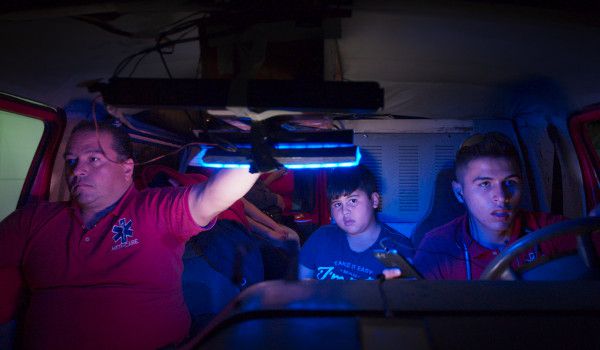Eye For Film >> Movies >> Midnight Family (2019) Film Review
Midnight Family
Reviewed by: Amber Wilkinson

Mexico City has a population of around nine million, who are served by just 45 official ambulances. To put this in perspective, London, which has slightly fewer citizens had, as of 2017, just shy of 450 of them, not to mention an assortment of additional support vehicles. As a result of this, a rash of for-profit ambulances also roam Mexcio City, looking for work and Luke Lorentzen hops aboard one of them for this fly-on-the-wall documentary.
The ambulance in question belongs to the Ochoa family - dad Fer, his 17-year-old son Juan and his younger son Josué , accompanied by a friend - a likeable bunch, even if it's clear their actual medical skills and equipment are limited. Each night they listen to the police scanner and raise to the scene of accidents or crimes, hoping to arrive ahead of their rivals. Lorentzen keeps his camera on the family - whether they're racing through the streets on a wave of adrenaline and noise, yelling at buses and bicycles to get out of their way or in quieter moments as Juan recounts his day to his girlfriend.

By keeping the camera in the back of the ambulance largely at a level above that of the various patients, Lorentzen ensures the film never becomes voyeuristic. Instead, we mostly experience the ailments of those being ferried to hospital via the stress and reactions of the family. What soon becomes apparent is that the financial situation is precarious. The Ochoas have to pay police and they hope to get the money back from the people they help and, when that seems to be a failing ruse, from hospitals who'll pay for a patient.
Therein hangs the problem - how to navigate a system that is by its very nature riddled with corruption, without becoming morally compromised themselves. There's also the additional problems created by leading a nocturnal life, not least the affect that it has on Josué's schooling.
Lorentzen - who shot the film himself - offers no easy answers and there is a sense of him possibly pulling away from some of the more morally dubious moments in the film because of the strong connection he has forged with the family. A connection that we also feel by the end, especially to the resourceful and charismatic Juan, who is making the best of a bad job. Although the observational style means there is a lack of background beef, which would be a welcome addition in terms of context, this is an eye-opening look at a system shows the importance of governmental regulation and what happens when there is none.
Reviewed on: 03 Apr 2019
















